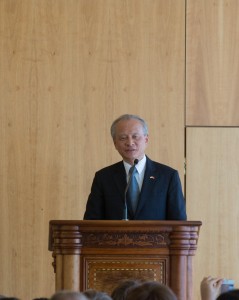
The Chinese Ambassador to the United States, Cui Tiankai, addressed BYU students and faculty in the assembly hall at the Hinckley Visitors Center on Tuesday afternoon.
Ambassador Tiankai said he was first exposed to BYU when he watched a television broadcast of BYU’s Young Ambassadors performing in China over 30 years ago.
“Ever since then, I have had the dream that someday I would come here to visit the campus and the people here,” Tiankai said.
Ambassador Tiankai explained that Chinese President Xi Jinping’s visit to the United States acted as an ideal backdrop to his remarks.
“There is no better timing for me to talk about relations between China and the U.S.,” Tiankai said. “Just ten days ago President Xi Jinping concluded a successful visit to the United States,” Tiankai said.
Tiankai said that the meeting between President Obama and President Xi Jinping was incredibly successful.
“The most important signal that both countries sent out following the meeting was that China and the United States need to be partners in cooperation rather than rivals in confrontation,” Tiankai said.
Ambassador Tiankai outlined three facets to U.S. relations with China: why cooperation is necessary, what can be accomplished with cooperation and what changes can be made to improve these relations.
Why cooperate?
Tiankai pointed out that China and the U.S. have interdependent economies that demand cooperation.
“When the U.S. economy is growing, it’s good news for the Chinese economy,” Tiankai said. “And when China’s economy is doing well, it is good news for the U.S. economy.”
Tiankai explained that these two nations must also cooperate to ensure global safety.
“As members of the UN security council, these two nations have a shared responsibility to maintain international peace and security,” Tiankai said.
The Ambassador addressed several global challenges that affect both the U.S. and China. Tiankai said some of these obstacles include climate change, disease prevention and response to natural disasters.
“All these global challenges cannot be handled by any one country,” Tiankai said. “Without our cooperation, none of them can be managed.”
What can be achieved?
“We are already working with each other on so many fronts,” Tiankai said.
Tiankai mentioned that one instance of this cooperation occurred when China and the U.S. coordinated to combat the recent Ebola crisis in West Africa.
“There are photographs of U.S. military members helping unload Ebola relief supplies for Liberia from Chinese planes,” Tiankai said. “The two militaries were working with each other side by side to help the African people, so we know that the possibility for cooperation is definitely there.”
How can these nations better cooperate?
“China and the U.S. need to further enhance mutual trust, especially about each other’s strategic intentions,” Tiankai said. “China has no intention to challenge the United States’ global position, but communication and true mutual understanding about this issue is hard to come by.”
Tiankai said he recognized that China and the United States have obvious differences.
“We are very different nations,” Tiankai said. “China and the U.S. have different histories and different cultures. They are at different stages of economic development. But our common interest is much larger than any possible differences we might have.”
Tiankai said he believed that stronger relationships and greater understanding could be accomplished outside of formal national meetings.
“These two nations need to put more stress on sub-national cooperation, mainly people-to-people dialogue,” Tiankai said.
The Ambassador concluded with a positive assurance to audience members.
“I will be going back to Washington, D.C. with confidence in the relationships between China and the United States.” Tiankai said.




